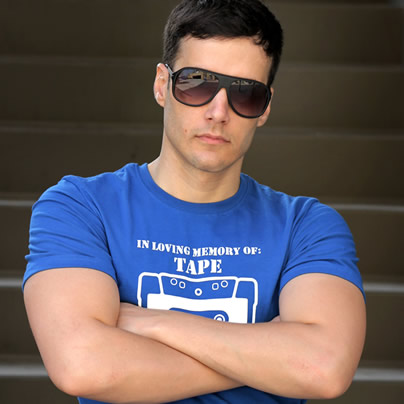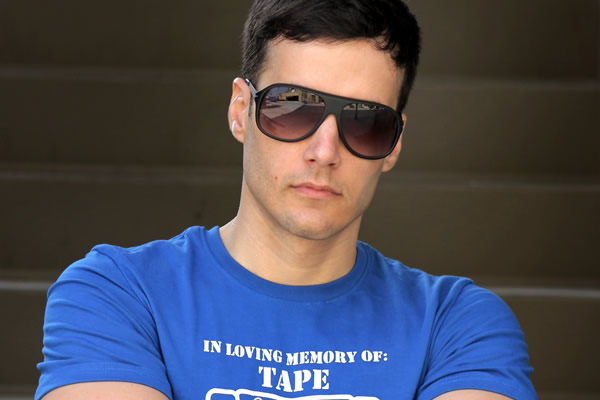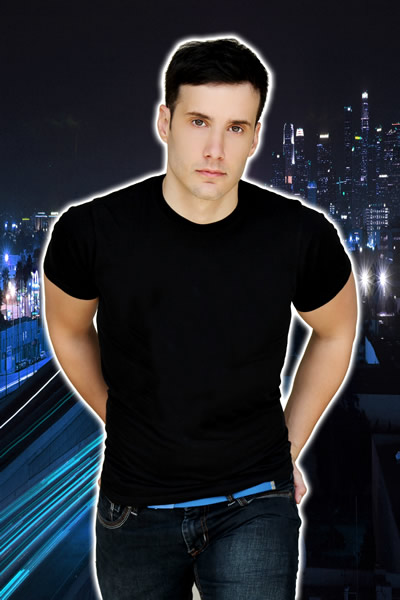Arts & Entertainment
‘He can really energize a dancefloor’
DJ Joe starts new monthly residency Friday at Cobalt


Joe Gauthreaux (Photo courtesy of Project Publicity)
The first song DJ Joe Gauthreaux remembers hearing on the radio was “Material Girl.” He was 5, it came on the car radio and made an indelible impression.
“It’s the first song I ever remember listening to as a child,” he says during a phone chat from Ft. Lauderdale. “My dad was like, ‘Ugh, that’s that Madonna,’ and … of course because they hated it so much, that made me love it all the more.”
He also feels kinship with Madonna because they share the same birthday — Aug. 16.
Gauthreaux — pronounced GO-troh — has gradually made a name for himself in the gay club scene over the last decade or so. Named “hottest DJ of the year” by Out Magazine in 2005, he’s remixed tracks for Kristine W., Jeanie Tracy and Tony Moran. Working with Joey Arbagey, an A&R rep at Universal, he’s broken into the major label world doing remixes for NeYo, The Wanted and Melanie Amaro. Three of his remixes are on the official maxi for teen idol Justin Bieber’s No. 2 (Hot 100) hit “Boyfriend.”
Now living again in New York after five years in Los Angeles, Gauthreaux is closer to D.C. He’s DJ’ed at Cobalt about four times in the last couple years and has now accepted a residency there that commences Friday from 10 p.m.-3 a.m.. It won’t always be the last Friday of the month — the next two installments are slated for Feb. 15 and March 15 — but Gauthreaux (djjoeg.com) will be there monthly. Cover is $10 and includes free vodka drinks from 11 to midnight. Keenan Orr spins downstairs (cobaltdc.com).
“After I moved back to New York, I talked to (Cobalt manager) Mark (Rutstein) about the idea of starting my own party. I really like the idea of playing somewhere regularly. On one hand, you don’t want to get too exposed, but the flip side is you can really build on it and go somewhere with the crowd over time.”
Rutstein says Gauthreaux’s move back to the East Coast makes it easier to get him down here.
“It’s a lot easier, we don’t have to fly him in from L.A. each time,” Rutstein says. “It’s really super exciting to have Joe here all the time. He has a strong following in D.C. and always packs the house.”
Rutstein also says Gauthreaux is one of the most accommodating DJs he’s worked with.
“Everyone is really different,” he says. “Joe and I just text each other and say, ‘Hey, you wanna spin?’ Drew G is the same thing. Others, like, say Junior Vasquez, take several several several e-mails and calls. Then there are others, like Peter Rauhofer, who has never once even returned my calls, so it just depends.”
Gauthreaux is established enough, he says, that crowds are willing to go where he takes them musically — within reason.
“I’ve been around awhile, so there’s a sense of trust there I think,” he says. “I’ve done my fair share of events so people know, ‘Oh, we’re gonna go hear Joe,’ they almost expect me, I think … they almost expect something a little different. Of course, I’ll play Rihanna, Madonna, but it’ll usually be a different mix they haven’t heard. You don’t want to do a whole hour of stuff they don’t know, even a really adventuresome crowd has a limit, but there’s definitely a happy medium you find. I’d feel guilty if I didn’t throw in at least a few things everybody knows. You tend to think, ‘Oh, the crowd just wants to hear the hits,’ but there’s always 10 people there who want to hear something new, so you have to find that balance.”
Erik Lars Evans, a local DJ who’s followed the gay club scene for years and considers himself a Gauthreaux fan, says Gauthreaux’s willingness to adapt has worked to his advantage.
“He’s very good at what he does and can really energize a dance floor,” Evans says. “I’ve been going to hear him spin as far back as 2002 … and he does exactly what a good DJ is supposed to do — he’s adapted. I’d say his current style is more a mix of progressive beats, house classics and circuit energy and I’d say that’s what makes him stand out in his own way and keeps fans coming to hear him.”
Evans says one of the most noticeable differences in dance music over, say, the last decade is a gradual increase of pop infiltration in gay clubs and not as much the niche artists one traditionally heard on gay dancefloors but nowhere else.
“In modern times, we’ve seen the breakdown of that barrier and you’ve seen mainstream music take over,” Evans says. “You still hear niche artists, but it’s not like it used to be.”
In some ways — and though they share the same Billboard chart — the explosion of dance music in straight culture with Deadmau5 showing up on the Grammys and on the cover of Rolling Stone with a strong rise in popularity for DJs like Skrillex, Swedish House Mafia, Avicii and Tiesto, is its own phenomenon, happening apart of gay DJs.
“I think the separation is just more apparent now because their scene has gotten so big,” Gauthreaux, who’s gay, says. “Dance for straight people was pretty much non-existent 10 years ago. I don’t want to pigeonhole them, but a lot of them were just so into hip-hop, which nowadays has gone more underground, but dance music is on the radio. I mean if you listen to Rihanna’s new album, half the songs are already club ready. Before that would never have been the case and you had to remix everything. It’s just a natural thing with the way music changes. In five years from now, it could be totally different, I’m not sure.”
Gauthreaux says the genres are distinct because gays and straights party differently.
“At the end of the day, there’s a certain comfort at walking into a club and knowing 99 percent of the people there are people you could go up and buy a drink for,” he says. “Nobody wants to be guessing, ‘Is this guy straight?,’ ‘Is this guy gay?’ It’s just a different clubbing culture altogether. Gay people go out and party. They’re not into VIP booths and champagne bottles and buttoned up shirts and girls in high heels. It’s also more violent, typically, at the straight clubs. In the gay clubs, you don’t have to worry about fights breaking out. We don’t care about champagne service. We want a DJ box and we want to get down. I think there’s a long way to go before it’s all intertwined.”
The ‘treau triv

Joe Gauthreaux (Photo courtesy of Project Publicity)
Current relationship status: Single
Any tattoos? Yes, one. My sign — Leo.
Do you follow astrology? I don’t follow every sign, but I certainly know my sign and I’m so 100 percent my sign, it’s not even funny. I also know the compatible signs for Leos.
But just for fun or seriously? Let’s say this — if I meet somebody and they’re not one of the compatible signs for me, I’m a LOT more cautious. I know that sounds ridiculous, but there’s an aspect to it that I very much believe.
How much of your set is live? “I’ve never not played live. That would just be so weird. It’s not like I’m remixing everything live right there on the spot, of course. If you want to do a mash-up or something, of course, you do that ahead of time on the computer, but that’s just one track. It’s such a creative art form, you have to feed off the crowd and you can’t do that at home by yourself.”
How long do you typically spin? “Usually four to five hours. Sometimes less if there are other DJs on the bill. But you have to take time to get a good grove going.”
Photos
PHOTOS: Montgomery County Pride in the Plaza
LGBTQ celebration held in downtown Silver Spring

Montgomery County Pride in the Plaza was held on Sunday, June 29 at Veterans Plaza in Silver Spring, Md.
(Washington Blade photos by Michael Key)























The fifth annual Fredericksburg Pride march and festival was held on Saturday, June 28. A march through the streets of downtown Fredericksburg, Va. was followed by a festival at Riverfront Park.
(Washington Blade photos by Michael Key)



















India
Anaya Bangar challenges ban on trans women in female cricket teams
Former Indian cricketer Sanjay Bangar’s daughter has received support

Anaya Bangar, the daughter of former Indian cricketer Sanjay Bangar, has partnered with the Manchester Metropolitan University Institute of Sport in the U.K. to assess her physiological profile following her gender-affirming surgery and undergoing hormone replacement therapy.
From January to March 2025, the 23-year-old underwent an eight-week research project that measured her glucose levels, oxygen uptake, muscle mass, strength, and endurance after extensive training.
The results, shared via Instagram, revealed her metrics align with those of cisgender female athletes, positioning her as eligible for women’s cricket under current scientific standards. Bangar’s findings challenge the International Cricket Council’s 2023 ban on transgender athletes in women’s cricket, prompting her to call for a science-based dialogue with the Board of Control for Cricket in India and the ICC to reform policies for trans inclusion.
“I am talking with scientific evidence in my hand,” Bangar said in an interview posted to her Instagram page. “So, I hope, this makes an impact and I will be hoping to BCCI and ICC talking with me and discussing this further.”
On Nov. 21, 2023, the ICC enacted a controversial policy barring trans women from international women’s cricket. Finalized after a board meeting in Ahmedabad, India, the regulation prohibits any trans player who has experienced male puberty from competing, irrespective of gender-affirming surgery or hormone therapy. Developed through a 9-month consultation led by the ICC’s Medical Advisory Committee, the rule aims to safeguard the “integrity, safety, and fairness” of women’s cricket but has drawn criticism for excluding athletes like Canada’s Danielle McGahey, the first trans woman to play internationally. The policy, which allows domestic boards to set their own rules, is slated for review by November 2025.
Bangar shared a document on social media verifying her participation in a physiological study at the Manchester Metropolitan University Institute of Sport, conducted from Jan. 20 to March 3, 2025, focused on cricket performance. The report confirmed that her vital metrics — including hemoglobin, blood glucose, peak power, and mean power — aligned with those of cisgender female athletes. Initially, her fasting blood glucose measured 6.1 mmol/L, slightly above the typical non-diabetic range of 4.0–5.9 mmol/L, but subsequent tests showed it normalized, reinforcing the study’s findings that her physical profile meets female athletic standards.
“I am submitting this to the BCCI and ICC, with full transparency and hope,” said Bangar. “My only intention is to start a conversation based on facts not fear. To build space, not divide it.”
In a letter to the BCCI and the ICC, Bangar emphasized her test results from the Manchester Metropolitan University study. She explained that the research aimed to assess how hormone therapy had influenced her strength, stamina, hemoglobin, glucose levels, and overall performance, benchmarked directly against cisgender female athletic standards.
Bangar’s letter to the BCCI and the ICC clarified the Manchester study was not intended as a political statement but as a catalyst for a science-driven dialogue on fairness and inclusion in cricket. She emphasized the importance of prioritizing empirical data over assumptions to shape equitable policies for trans athletes in the sport.
Bangar urged the BCCI, the world’s most influential cricket authority, to initiate a formal dialogue on trans women’s inclusion in women’s cricket, rooted in medical science, performance metrics, and ethical fairness. She called for the exploration of eligibility pathways based on sport-specific criteria, such as hemoglobin thresholds, testosterone suppression timelines, and standardized performance testing. Additionally, she advocated for collaboration with experts, athletes, and legal advisors to develop policies that balance inclusivity with competitive integrity.
“I am releasing my report and story publicly not for sympathy, but for truth. Because inclusion does not mean ignoring fairness, it means measuring it, transparently and responsibly,” said Bangar in a letter to the BCCI. “I would deeply appreciate the opportunity to meet with you or a representative of the BCCI or ICC to present my findings, discuss possible policy pathways, and work towards a future where every athlete is evaluated based on real data, not outdated perceptions.”
Before her transition, Bangar competed for Islam Gymkhana in Mumbai and Hinckley Cricket Club in the U.K., showcasing her talent in domestic cricket circuits. Her father, Sanjay Bangar, was a dependable all-rounder for the Indian national cricket team from 2001 to 2004, playing 12 test matches and 15 One Day Internationals. He later served as a batting coach for the Indian team from 2014 to 2019, contributing to its strategic development.
Cricket in India is a cultural phenomenon, commanding a fanbase of more than 1 billion, with more than 80 percent of global cricket viewership originating from the country.
The International Cricket Council, the sport’s governing body, oversees 12 full member nations and more than 90 associate members, with the U.S. recently gaining associate member status in 2019 and co-hosting the 2024 ICC Men’s T20 World Cup. The BCCI generated approximately $2.25 billion in revenue in the 2023–24 financial year, primarily from the Indian Premier League, bilateral series, and ICC revenue sharing. The ICC earns over $3 billion from media rights in India alone for the 2024–27 cycle, contributing nearly 90 percent of its global media rights revenue, with the BCCI receiving 38.5 percent of the ICC’s annual earnings, approximately $231 million per year.
Women’s cricket in India enjoys a growing fanbase, with over 300 million viewers for the Women’s Premier League in 2024, making it a significant driver of the sport’s global popularity. The International Cricket Council oversees women’s cricket in 12 full member nations and over 90 associate members, with the U.S. fielding a women’s team since gaining associate status in 2019 and competing in ICC events like the 2024 Women’s T20 World Cup qualifiers. The BCCI invests heavily in women’s cricket, allocating approximately $60 million annually to the WPL and domestic programs in 2024–25, while contributing to the ICC’s $20 million budget for women’s cricket development globally. India’s media market for women’s cricket, including WPL broadcasting rights, generated $120 million in 2024, accounting for over 50 percent of the ICC’s women’s cricket media revenue.
“As a woman, I feel when someone says that they are women, then they are, be trans or cis. A trans woman is definitely the same as a cis woman emotionally and in vitals, and specially, when someone is on hormone replacement therapy. Stopping Anaya Bangar from playing is discrimination and violation of her rights. It is really sad and painful that every trans woman need to fight and prove their identity everywhere,” said Indrani Chakraborty, an LGBTQ rights activist and a mother of a trans woman. “If ICC and BCCI is stopping her from playing for being transgender, then I will say this to be their lack of awareness and of course the social mindsets which deny acceptance.”
Chakraborty told the Blade that Bangar is an asset, no matter what. She said that the women’s cricket team will only benefit by participation, but the discriminating policies are the hindrance.
“Actually the transgender community face such discrimination in every sphere. In spite of being potent, they face rejection. This is highly inhuman. These attitudes is regressive and will never let to prosper. Are we really in 2025?,” said Chakraborty. “We, our mindset and the society are the issues. We, as a whole, need to get aware and have to come together for getting justice for Anaya. If today, we remain silent, the entire community will be oppressed. Proper knowledge of gender issues need to be understood.”
The BCCI and the International Cricket Council have not responded to the Blade’s repeated requests for comment.



















